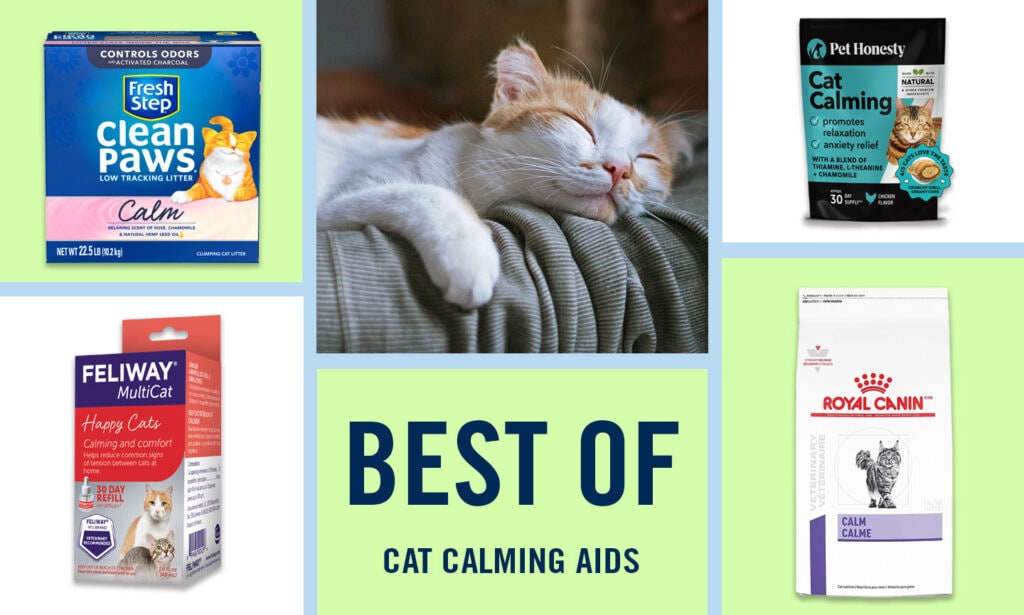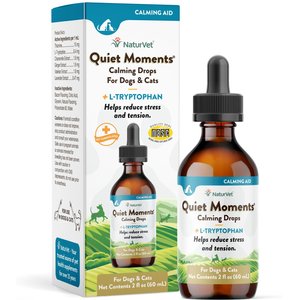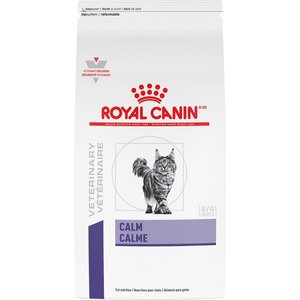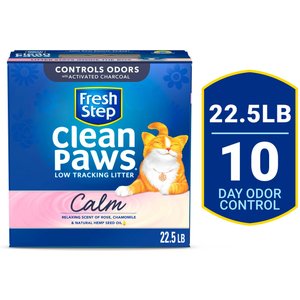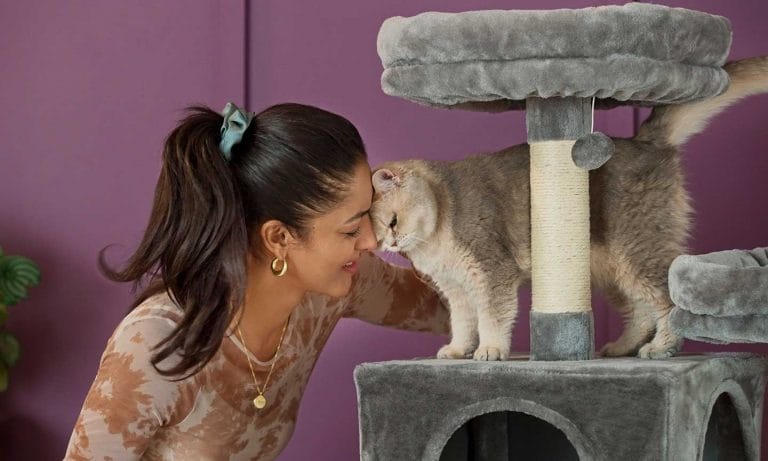If your sweet feline struggles with anxiety, a cat calming aid may be just the thing to help your sensitive friend feel less stressed. While talking to your vet should always be your first step, cat calming aids can be a useful tool for managing everything from separation anxiety to stressful situations, like vet visits, loud thunderstorms or having company over.
That’s why we’ve rounded up the best calming aids for cats as rated and reviewed by Chewy pet parents like you. These best-selling and top-rated calming products have helped provide stress relief for cats who need a little extra help coping with their anxiety—so you both can enjoy less stress and more cuddles.
-
1
Best Overall Cat Calming AidFeliway® MultiCat Calming Diffuser Refill for Cats, 30 day, 1 count $21 on Chewy
- 2
-
3
Best Calming Plug-in DiffuserFeliway® MultiCat Calming Diffuser Refill for Cats, 30 day, 1 count $21 on Chewy
-
4
Best Cat Calming DropsNaturVet® Quiet Moments® Calming Drops for Cats & Dogs, 2-oz bottle $23 on Chewy
-
5
Best Calming Powder Supplement for CatsVibeful™ by Chewy Behavior Support Powder Calming Supplement for Small Dogs & Cats,... $28 on Chewy
How To Find the Best Cat Calming Aid
There are a variety of different types of cat calming aids on the market (see more on the types below). Kimberly Boudwin, VMD, chief medical officer at Providence Animal Center in Media, Pennsylvania, suggests following these important tips before buying a calming aid for cats.
- Consult your vet. Discuss your cat’s anxiety triggers and health history for tailored recommendations. Your vet may also be able to determine if the cause of anxiety is medically related.
- Ensure safety. Always choose products or remedies that are cat-safe and administer them as directed. This means buying well-reviewed, highly rated products that are formulated specifically for cats. Keep an eye on your cat after providing a calming aid to make sure there are no adverse side effects.
- Consider the type of aid. Calming aids for cats come in a variety of forms, including sprays, calming diffusers, chews and calming collars. You’ll want to choose an item based on the source of anxiety and your cat’s needs and preferences. For example, if your cat seems stressed while you’re away from home, then calming treats may not be as effective as a plug-in wall diffuser that helps them feel calm throughout the day.
7 Best Cat Calming Aids
We’ve rounded up the best cat calming products that other pet parents just like you use and recommend. These top-selling, top-rated calming aids get two paws up from cat parents like you.
Best Overall Cat Calming Aid
-
Works wonders
My handicapped cat used to have back spasms quite often. In the 6+ months since I started using Feliway, the spasms are almost nonexistent.
-
Calming defuser
We have a Maine coon cat with behavior problems. Our 2 cats have been more calm since using this plug in.
-
Keeps my boys calm and friendly!
I started using this 18 months ago when my cats were experiencing serious redirected aggression. It works like a charm!! I have it on my Autos hip order so I never run out. Highly recommend it.
Best Cat Calming Supplement
-
Savory
I have a picky cat that doesn’t seem to like treats but she loves these! Not sure how well it works to keep her calm, but she seems very happy lately
-
Calm cat
My cat is on Anexity meds and this has helped him. As a kitten I used this to help him calm down and it is still working.
-
Calming
These chews smell almost like peanut butter. They really do help my cat to become a little calmer. Just a few a day is all she needs
Best Calming Plug-in Diffuser
-
Works wonders
My handicapped cat used to have back spasms quite often. In the 6+ months since I started using Feliway, the spasms are almost nonexistent.
-
Calming defuser
We have a Maine coon cat with behavior problems. Our 2 cats have been more calm since using this plug in.
-
Keeps my boys calm and friendly!
I started using this 18 months ago when my cats were experiencing serious redirected aggression. It works like a charm!! I have it on my Autos hip order so I never run out. Highly recommend it.
Best Cat Calming Drops
-
Very chill!
I like this product because I can use it for both my dog and cats! Doesn't take as much as recommended to chil everyone out! Doesn't make them too sleepy. Good for any animal scared to go to the vet.
-
Recommended!
Klondike celebrated his 5th birthday (2023) and quickly went into depression the next day, not eating, not drinking, stays hidden in one spot all day long not moving an inch, over grooming and removing fur by the mouthful. I tried this out of desperation and this stuff is great! One dose and he's back to being a kitten, like when I adopted him, a clingy, very huggy, gives lots of kisses, playful, sweetheart, he's eating and drinking and talkative again. Klondike's a big maine coon so he ended up with 1L dosage. He's not a fan of bacon flavor. Wish it comes is seafood flavor.
-
Calmed the anxious kitty
Give it a couple weeks if they aren't having a negative reaction from it. My kitty wouldn't go near the dog for almost 2 years. He stayed upstairs behind the gate. Now he comes through and sniffs around the dog and doesn't mind being downstairs with him. Impressed! We use 1ml for our 14 pound cat with his dinner.
Best Calming Powder Supplement for Cats
-
Bring this back please!
This product is absolutely amazing. It’s the only thing I have found to calm one of my cats. It worked miracles. Please consider bringing it back!!!
-
Miracle for FHS
My 1.5 year old cat has Feline Hyperesthesia Syndrome & this has been an absolute miracle. I wish I would have stockpiled it because nothing else has worked. Now he's back to being miserable and I'm heartbroken for my boy. I've tried so many things & this is the 1 & only that has worked. It doesn't sedate him at all, just keeps him from thinking his tail is attacking him and allows him to be a happy & content kitty. Please please please bring this item back...
-
Two cats that feud.
This works great for my two-cat household. It works great, they relax and stop feuding within a short time.
Best Calming Cat Food
-
Can't live without!!!!
This formula is better than all the stress relievers in the world. My hyperactive cat is calmed with this formula and it is possible for us to live together!!! He can still be a naughty boy but manageable. Most grateful for Royal Canin. Worth every penny.
-
Quick Delivery
Needed this special food for my anxious cat and Chewy delivered quickly! Already have noticed a difference in her behavior!
-
Super idea for my semi nervous cat
When I found this grain on Chewy, I ordered it right away. My cat was slowing down on his regular grain intake but has picked up to normal eating again. Most days his bowl is completely empty at feeding time.
Best Calming Cat Litter
-
Best Cat Litter
This was the best cat litter I found works well with Litter Robot. It clumps good leaves less mess inside also less tracking litter and didn't have a nasty smell. I was disappointed when they stopped manufacturing this litter type.
-
This cat litter is the best! Will Chewy be carrying it again?
Living in Florida and you're from the North "Go Buckeyes! you can expect to receive company from the North ... and when you run out of bedrooms and have to put the cat's little box in owner's bedroom this litter at least drowns out the smell with a better scent. Please keep making this.
-
Great product.
Overall my favorite litter, I've tried many over the years. Low to no dust, last longer than regular Freshstep. Kitties are also satisfied. It is my 1st choice I litter.
How We Chose These Calming Products
Every product selected in our roundup of the best cat calming aids is top-rated at Chewy, which means they’ve all received a 4-star review or higher. They’re also best-selling products, which means you can rest assured that everyday cat parents just like you have used the products and swear by them. We know how tough it is to find a product that works, and we’re happy to do the research for you!
Types of Cat Calming Aids
Just as there are all sorts of stressful situations for your favorite feline, there are many different types of calming aids to choose from. Now that you know what the best ones are, let’s dig a little deeper into some of the most common options pet parents use.
Supplements
Supplements, including calming chews and powders, are given to your pet orally. These chewable items are formulated with ingredients that bring relief from occasional anxiousness, such as the amino acid L-theanine, thiamine, L-tryptophan, melatonin, passionflower and more. While these supplements are formulated in flavors that cats should find appealing, some cats still may not like them. “If your cat will eat them readily, they are a great addition to your behavior treatment plan,” Dr. Boudwin says.
Plug-in Diffuser
A calming diffuser typically uses a synthetic pheromone that mimics the natural calming pheromones a mother cat produces. Simply plug them in to the wall socket and replenish as needed (about once a month). Dr. Boudwin says this is an excellent option and one she often recommends, as they are very safe, non-invasive, inexpensive and easy to use.
Food
Certain diets can help soothe a high-strung cat, so pet parents may want to consider switching up their cat’s meal plan. Calming cat foods are often formulated with ingredients that have a calming effect—such as chamomile, L-theanine, L-tryptophan and thiamine—which can help maintain calmness and alleviate certain stress-related cat behaviors. Some also target other problems brought on by stress, like hairballs and skin issues from over grooming.
Calming Drops
If your cat’s already settled with their diet and you don’t want to disrupt it, another option is to add calming drops to their meals or treats. Similar to the food, these are formulated with ingredients known for their calming benefits, such as L-tryptophan and chamomile. All you need to do is add the recommended dosage to their food to help bring them some much-needed comfort.
Litter
The litter box is a common source of cat stress, Dr. Boudwin says, particularly in multi-cat households or in situations where the location, cleanliness or litter type isn’t up to your pet’s standards. Simply keeping the litter box clean, putting it in an accessible location, and having one for every cat in the family (plus one additional box) can help immensely. As noted, there are also litters infused with calming scents, such as lavender, rose or chamomile, that you can use.
How To Calm Cats
A stressed cat is no fun for anyone, especially if the stress brings on destructive behavior, ongoing animal fights or potty problems. That said, stress is the hardest on your poor feline.
Signs of stress in cats include:
- Increased heart rate
- Open-mouth breathing
- Agitation
- Decreased appetite
“Some cats are really good at hiding their stress, and a lot of cats manifest their stress in ways that most people wouldn’t think were related to stress, such as urinating outside the litter box, drooling, excessive crying or hiding,” Dr. Boudwin says.
Finding them relief as soon as possible is important. Follow this advice from Dr. Boudwin on how to calm cats.
Step 1: Identify the Stress Trigger
Observe your cat’s behavior to pinpoint any potential anxiety triggers. Common stressors for cats are often related to unclean litter boxes (or not enough boxes for multi-cat households), other animals, changes in routine or their environment, and health issues. All triggers require a unique response to help soothe your cat’s anxiety. Again, your vet can help you find the best solution.
Step 2: Create a Safe, Stress-Free Environment
Creating a calm, quiet and safe space for your cat can potentially help reduce their anxiety levels. If it’s another pet who’s making them stressed, allowing them to isolate in this safe space is ideal. Make sure that the area has what they need, including a clean litter box and access to water and food. Also try to keep the area as quiet as you can with minimal movement.
Step 3: Use Calming Aids
In addition to addressing their environment, introducing calming cat aids like the ones discussed above help bring your kitty some much-needed relief. Select the best type of calming aid according to your cat’s triggers and preferences.
Step 4: Engage in Stimulating Activities
Cats benefit from a healthy dose of both mental and physical stimulation every day. This improves their mental well-being and can help lower stress levels. Both mental and physical stimulation can come from playing fun games with your cat. Let them chase after a laser toy, toss them catnip-filled toys or tease them with feather wands.
Talk to Your Veterinarian
Since all cats and scenarios are different, talk to a veterinarian for guidance about the best calming aid for your cat. It’s also important to see your vet if things aren’t getting better or the situation seems severe.
“Anytime your cat is exhibiting signs that are outside of their ‘normal,’ it’s worth going to your vet to have them checked out,” Dr. Boudwin says. “Sometimes it can be really hard to tell if a behavior is from stress or an underlying medical condition. In some cases, stress in cats can cause really significant health issues, such as urinary tract problems.”
Cat Calming FAQs
Q: What causes cat anxiety?
A: The most common causes of cat anxiety include interactions with other animals, new people or children in the house, and pain or health issues. “Another very common issue is anxiety around the litter box,” Dr. Boudwin says. “Cats can become stressed if it’s too small, dirty or [in] a new location. Competition between cats over the litter box can also cause significant stress in a cat’s life.”
Q: Do calming aids work for cats?
A: Yes, calming aids can work for cats, but results are often mixed. The key to managing stress—and any resulting behavioral issues—is to take a multi-modal approach that encompasses behavior modification, adjusting the environment, and calming aids. Prescription medications from your vet may also be helpful.
Q: What do vets recommend for cat anxiety?
A: Vets recommend identifying the source of anxiety in your cat and addressing it promptly. This may mean switching up the litter box situation, isolating your cat from other animals in the home, or eliminating stressful scenarios as best as you can (like loud noises or lots of movement). Adjustments in the environment and calming aids can help.
Q: How can I calm my stressed cat naturally?
A: Naturally calming your cat involves addressing their environment and their potential stress triggers. Do your best to eliminate these stressful scenarios for quick improvement. From there, you can use calming aids administered as directed and provide them with mental and physical stimulation.
Life can be stressful, but with the best cat calming aids, you can help your feline bestie navigate tough times with ease so you both can enjoy more quiet moments together. Looking for more tips and tricks to help reduce your cat’s anxiety in addition to these cat calming products? Check out our ultimate guide on reducing stress for your pet.
Expert input provided by Kimberly Boudwin, VMD, chief medical officer at Providence Animal Center in Media, Pennsylvania.
This content was medically reviewed by Chewy vets.
Read more about how to keep your cat calm:
Share:
